The best SSD in 2024: top solid-state drives for your PC
Upgrade to the best SSD for faster speeds and loading times
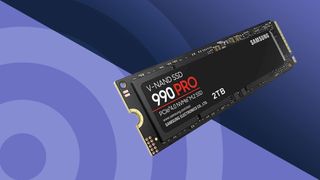
1. The list in brief
2. Best overall
3. Best budget PCIe 4.0
4. Best for laptops
5. Best gaming
6. Best PS5
7. Best high-endurance
8. Best SATA
9. Best portable
10. Best budget portable
11. How we test
12. Today's best SSD deals
The best SSD is an essential component for everything from the best gaming PC to high-end mobile workstations, and there's no shortage of great solid state drives to choose from.
If you're looking for the very best of the best though, the Samsung 990 Pro leads our list for blazing fast performance for most people out there. If you're like most of us, PCIe 5.0 SSDs are still just too new for even some of the best motherboards of the past three years, so PCIe 4.0 is still the name of the game for most, and the 990 Pro absolutely blows any rivals in its class out of the water.
If you're looking for more gaming-focused drives, then the Kingston Fury Renegade might be what you're after, especially with its PS5 console compatibility. There's also the Patriot Viper VP4300, which has the highest endurance rating of any PCIe 4.0 SSD right now. Whatever you're after, I'm here to help you find the best SSD that fits your needs and budget.
Recent updates
This guide was updated on February 22, 2024, to refresh existing entries with new benchmark results and to add a new entry, the Samsung 990 EVO, to the list.
The quick list
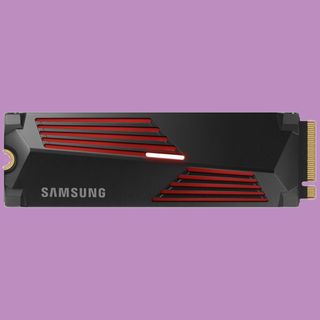
The best SSD overall
Whatever your specific need, this is the SSD that will get the job done better than any other, at least until PCIe 5.0 SSDs hit the scene.
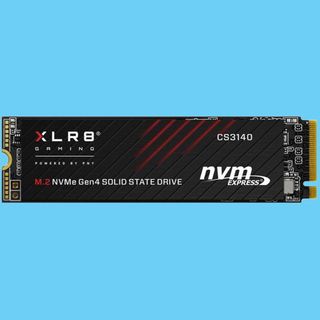
The best budget PCIe 4.0 SSD
Not only does this SSD offer fantastic performance across the board, it's much cheaper than rival high-performance SSDs in its class.
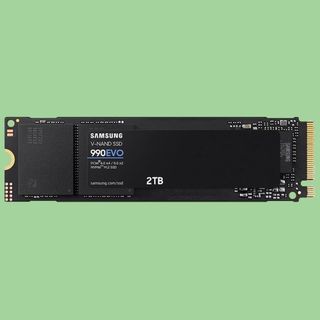
The best laptop SSD
While the 990 EVO doesn't get the raw transfer rate of the 990 Pro, it has much better energy efficiency, providing excellent performance at a much lower power cost, making it ideal for laptops.
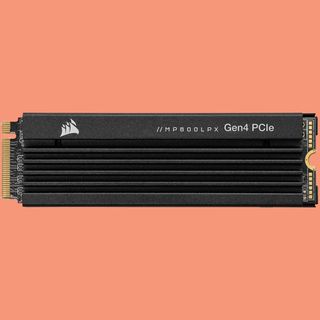
The best gaming SSD
The Corsair MP600 Pro LPX is arguably the best PCIe 4.0 SSD on the market for gaming, and its PS5 compatibility only sweetens the deal.

The best SSD for PS5
With best-in-class read speeds, this M.2 SSD will make the best open-world games on PS5 more immersive with fewer loading screens.
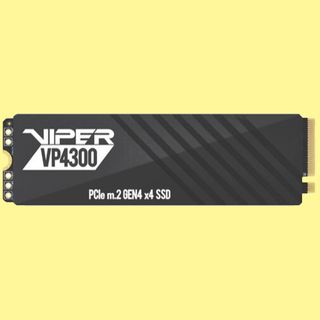
The best high-endurance SSD
If you want a high-performance M.2 SSD that goes the distance, the Viper VP4300 will still be running strong long after its rivals falter.
Load the next 3 products

The best SATA SSD
SATA SSDs might be on their way out, but they're not totally useless yet, and if you need a SATA SSD, this is absolutely the one to get.
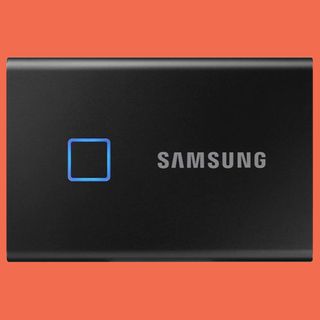
The best portable SSD
When it comes to portable storage, the gold standard is the Samsung T7 Touch, which features fast data speeds and great security.

The best budget portable SSD
While not as fancy as the Samsung T7, this very affordable portable SSD offers decent data transfer speeds, especially for the price.

John has been working with computers since he was a teenager, long before he ever started writing about computer hardware or earning his Master's degree in Computer Science. Needless to say, he knows computers inside and out, and he has personally tested (and retested) all of the SSDs on this page, regardless of whether he wrote our original review, and has validated the results you'll find here.
The best SSD of 2024
Why you can trust TechRadar
Here, we've pulled together our top picks for the best SSD is several categories based on use case, price, and interface so you can get the right SSD, regardless of your circumstance.




The Best SSD overall
Specifications
Reasons to buy
Reasons to avoid
Samsung's 990 Pro SSD garnered plenty of attention when it was announced, primarily due to its sticking with the existing PCIe 4.0 standard instead of the anticipated PCIe 5.0. However, its performance—nearly maxing out the PCIe 4.0’s potential—silenced many of the naysayers. For gamers, it boasts unparalleled read speeds, while for creative professionals, its write speeds shine, especially during intensive tasks.
A standout feature: the 990 Pro's sequential writes significantly outpace both its predecessor and competitors. Additionally, it showcases impressive read speeds, nearing PCIe 4.0's maximum of 8,000MB/s. It's 7,449MB/s recorded sequential read speed in our testing is right at Samsung's promised read speed, while it's sequential write speed of 6,826MB/s in our tests is not quite at the promised 6,900MB/s, but it's damned close.
Our tests also found that the 990 Pro surpassing the 980 Pro, transferring a 10GB file about 9% quicker and copying a large folder roughly 32% faster. Such prowess translates to quicker game loads and swift app startups. This includes PS5 performance as well, where we were able to copy a 123GB game roughly 84% faster using the Samsung 990 Pro compared to the console's storage drive.
However, the 990 Pro comes with its caveats. Its current limited capacity options might deter some, though we anticipate more choices soon. Additionally, while its price matches high-performance PS5 SSDs, it sits higher than more budget-friendly SSDs like the PNY XLR8 CS3140. Those strictly budget-focused might consider a more affordable Samsung 980 or 970 Evo, though those will come with slower, but still respectable, data read, write, and transfer speeds.
In essence, the Samsung 990 Pro caters to a niche demanding peak performance. Until PCIe 5.0 SSDs really hit the scene, it remains a top-tier choice for enthusiasts and professionals alike.
Read the full Samsung 990 Pro review



The best budget PCIe 4.0 SSD
2. PNY XLR8 CS3140
Specifications
Reasons to buy
Reasons to avoid
The PNY XLR8 CS3140 SSD is one of the best M.2 SSDs around, both for gamers and PC enthusiasts alike. Available in three capacities—1TB, 2TB, and 4TB—this SSD is a great swan song for the PCIe 4.0 era as PCIe 5.0 SSDs start to roll out.
While PCIe 4.0 SSDs have a theoretical maximum speed of 8,000MB/s, the PNY XLR8 CS3140 pushes right up to that line with a rated sequential read speed of 7,500MB/s, along with a 6,850MB/s sequential write rating for its 2TB and 4TB capacities (5,650MB/s for 1TB).
Our tests reflect this for the most part, recording a sequential read speed of 7,256MB/s in CrystalDiskMark 8, with a somewhat lower-than-expected sequential write speed of 6,082MB/s in the same test. Interestingly though, it had the highest random write performance of any drive we tested (4,938MB/s), including the vaunted Samsung Pro 990, which had a roughly 17% slower random write rate (4,105MB/s). It also had the best average data copy rate of all the drives we tested recently with 1,733MB/s, so this is not only a great gaming SSD, it’s a fantastic all around performer at a great price.
Fortunately, PNY offers an optional heatsink that can be added to the drive to help keep temperatures in check, which is a must for a drive this fast. It also has a PS5-specific heatsink you can buy, making it an ideal pick for gamers aiming for optimized thermal performance on Sony's latest console.
So while there might be faster M.2 SSDs than the PNY XLR8 CS3140, its price-to-performance ratio makes it the best high-performance SSD for gamers and enthusiasts who don’t have the stacks to throw at Samsung or Corsair’s best SSD offerings.
Read the full PNY XLR8 CS3140 review



The best SSD for laptops
3. Samsung 990 EVO
Specifications
Reasons to buy
Reasons to avoid
The Samsung 990 EVO isn't the kind of PCIe 5.0 SSD many of us have been waiting for all these many years, especially considering that its actual performance would be fairly middle of the road were the 990 EVO a PCIe 4.0 drive like the 990 Pro.
But despite being restrained to just two PCIe 5.0 lanes (or four PCIe 4.0 lanes), the 990 EVO does manage to put up some pretty good numbers for sequential read and writes, and the claimed 5,000MB/s sequential read and 4,200MB/s sequential write data rates is more or less born out in our testing, with the 990 EVO hitting a 5,082.24MB/s sequential read speed in CrystalDiskMark 8, along with a 3,750.68MB/s sequential write speed.
And while the latter is about 450MB/s less than the promised max speed on average, depending on your system, it shouldn't be hard to hit those kinds of numbers, and the kind of workload does matter, as evidenced by the Patriot Viper VP4300 only hitting half the sequential read rate of the Samsung 990 EVO in PassMark's disk test, but CrystalDiskMark 8 has the Viper VP4300 way ahead of the 990 EVO.
Essentially, your mileage may vary based on what kind of data you're reading or writing to the drive, but you should see the 990 EVO hitting or nearly hitting its advertised speeds pretty regularly.
The biggest draw for this SSD though would be its improved power efficiency over its predecessor, the Samsung 970 EVO. The 990 EVO uses about 8% less power when reading and about 22% less when writing sequentially, which should help improve your laptop's battery life somewhat while not entirely throwing in the towel on performance.
Stay tuned for our full Samsung 990 EVO review...



The Best Gaming SSD
Specifications
Reasons to buy
Reasons to avoid
The Corsair MP600 Pro LPX made waves in the SSD market when it launched with competitive pricing and unparalleled speeds, and that remains the case today. Its PCIe 4.0 x4 M.2 SSD credentials deliver lightning-fast speeds, outshining cheaper, slower PCIe 3.0 alternatives, and keeping up with the very best SSDs on the market. Some PCIe Gen 4 drives might appear similar in value but fall short in maximizing the bandwidth that the MP600 Pro LPX exploits.
Our tests on the 2TB capacity drive revealed remarkable speeds: sequential read and write speeds of 7,364MB/s and 6,870MB/s, respectively. This outpaces both the WD_Black SN850 and Samsung 980 Pro SSDs, even surpassing Corsair’s own advertised rates.
Its random read/write operations aren’t the best among PCIe 4.0 SSDS, so this SSD is best suited for loading very large files like video games, large media files, or as a boot drive.
Corsair offers various cooling options for this drive, with the MP600 Pro LPX tailored with a low-profile heatsink fit for the PS5.
Read the full Corsair MP600 Pro LPX review
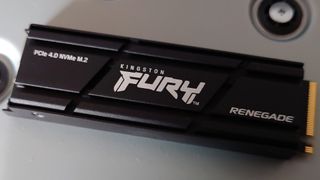
The best SSD for PS5
Specifications
Reasons to buy
Reasons to avoid
Sometimes, it's nice to have options, and most PC gamers aren't just tied to their PC anymore, so that makes the Kingston Fury Renegade a very appealing option for those who might be looking for something for either their PC or PS5.
This PCIe 4.0 SSD features blazing fast load times whether it's an open-world PS5 game like God of War: Ragnarok or you're looking to have Windows 11 be ready to go almost as soon as you touch the power button.
On PC, you can expect the Kingston Fury Renegade SSD to get sequential read speeds of up to 7,300MB/s and sequential write speeds of about 7,000MB/s, with lower write speeds generally for smaller capacities. Where the Renegade really shines though is its PS5 performance, with Sony's official SSD benchmark tool recording a 6,500MB/s read speed, the fastest we've seen in a PS5 system.
What's more, the Fury Renegade can come housed in a phenomenal, rugged heatsink to help the SSD hardware safe, or without a heatsink if your motherboard already has a heat management solution for your SSDs. If you're looking to buy one for your PS5 though, definitely go for the heatsink since the PS5 doesn't have a built in way to really manage an SSD's heat and the drive can get damaged as a result if you push it too hard.
Read the full Kingston Fury Renegade SSD review



The best high-endurance SSD
6. Patriot Viper VP4300
Specifications
Reasons to buy
Reasons to avoid
The Patriot Viper VP4300 is a major contender for the best SSD crown with its impressive sequential and random speeds, fast copy operations, and low operating temperature. But most of all, this SSD is built for the long haul with a best-in-class 1000TBW endurance rating for a 1TB drive, and a 2000TBW rating for a 2TB one.
This SSD also doesn't skimp on features. It provides two cooling options for the drive: a 4mm thick aluminum heatsink and an ultra-thin graphene label, which is perfect for tight spaces in like the best thin and light laptops.
Available in 1TB and 2TB capacities, the VP4300 offers rated speeds of up to 7,400MB/s read and 6,800MB/s write, which are pretty much spot on in our testing (where we recorded 7,389MB/s and 6,799MB/s sequential read and write speeds, respectively).
It's slightly more expensive than similar capacity SSDs, but it definitely compensates for this with its performance and durability, as well as the included "heatshield" options. These work exceptionally well, and this SSD has the lowest recorded max temperature (about 57℃) of any of the high-end PCIe 4.0 SSDs we've tested recently, including those on this list.
Tech-wise, the VP4300 is comparable to Samsung 980 Pro and WD Black SN850, as it employs a high-end PCIe 4.0 x4 SSD controller and premium NAND flash, the latter of which ensures robustness and efficiency, but it's performance is considerably outperforms those two SSDs, and really only struggles to keep up with the Samsung 990 Pro in terms of random data operations, blowing past most of its other competitors in that regard.
Ultimately, this SSD is about delivering fast, consistent performance for the entirety of its very long life, so if you're looking for an SSD to perform constant data operations rather than just load up the best PC games that you'll never actually uninstall, than the Patriot Viper VP4300 is the M.2 SSD you've been looking for.
Read the full Patriot Viper VP4300 review
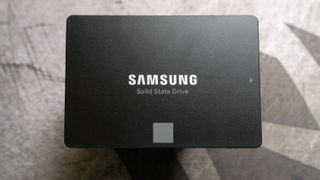
The best SATA SSD
Specifications
Reasons to buy
Reasons to avoid
We're definitely entering the twilight of the SATA SSDs, given how even the cheapest M.2 SSD will dramatically outperform a SATA drive with just about any workload, but they still have a place in a lot of people's machines, especially as more medium-term storage for large libraries of media files like photos and video when there aren't any PCIe slots available on the motherboard for another M.2 SSD.
While you might be able to score a SATA SSD for pennies on the dollar right now, that's not always a good thing, since you still want quality to protect your files, and the Samsung 870 Evo is a great SSD for the job. It's not too expensive at higher capacities, and the 870 Evo can go as large as 4TB, which is great.
Its endurance definitely makes it a cheap, long-term investment into your system's file storage, just don't expect too much speed out of this one. In our tests, it only managed a sequential read of 564.07MB/s and sequential write of 535.34MB/s in our tests, which is a fraction of what a PCIe SSD's random speeds are. Worse still, you can often find better PCIe SSDs at a lower price.
So don't expect blazing fast program load times off this SSD, but for holding onto some family videos to show off during the holidays, especially if you don't have a free PCIe SSD slot available, you can't go wrong.
Read the full Samsung 870 Evo SSD review
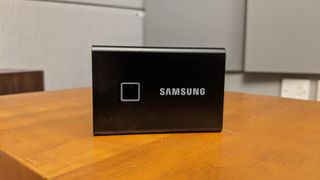
The best Portable SSD
Specifications
Reasons to buy
Reasons to avoid
The Samsung T7 is ideal if you’re looking for the best portable SSD with lots of features. This external storage is not only fast – with sequential read and write speeds of up to 1,050 and 1,000 MB/s, respectively – but it also boasts quite a few great features in the palm-sized package.
In our tests, the Samsung T7 came right up to the max rated speed given by Samsung, with CrystalDiskMark 8 reporting 1,032MB/s and 924MB/s sequential read and write speeds compared with the promised 1,050MB/s and 1,000MB/s, respectively.
The most important of those features is its built-in security options. This uses AES 256-bit encryption and gives you the option to use fingerprint sign-in, which you can set up through the device’s own management software.
On testing the kit, we found this drive offers the perfect balance between security, speed, portability and pricing. While it lacks IP68 and the security certifications of more expensive rivals, the price point makes it an attractive choice.
The Samsung T7 SSD could do with a rugged case, but it remains our pick for best portable SSD on the market, and is well worth your consideration.
Read our full Samsung T7 SSD review
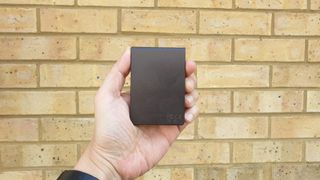
The best budget portable SSD
Specifications
Reasons to buy
Reasons to avoid
The Lexar SL200 didn't score expecially well back in 2020 when TechRadar Pro's Desire Athow first reviewed it, but Des has since recanted his harsh assessment of this portable SSD thanks to an aggressive price cut that has brought it in line with its performance.
Currently, it is the cheapest 2TB portable SSD you're going to find right now, and even though it is still far more expensive than a standard portable hard disk drive of similar capacity, an external SSD is a better long run solution for storing your data, files and folders, especially if you want to actually access them in a reasonably quick manner.
And while it is still fairly slow as far as portable SSDs go, its 464MB/s sequential read and 357MB/s sequential write speeds are much faster than anything you'll get with an external hard disk. It even manages to beat out Samsung's T5 SSD, which lagged behind with a 433MB/s and 323MB/s in sequential read and write tests, respectively.
It can even work with smartphones thanks to its native USB-C connector, letting you increase the storage of your mobile device or transfer files in a pinch.
Read the full Lexar SL200 1TB portable USB SSD review
How we tested the best SSDs
When looking at the performance of an SSD, we separate them by its interface, whether that's PCIe 5.0, PCIe 4.0, PCIe 3.0, or SATA III, since these will all have different maximum data transfer rates.
From there, we will mount the SSD on our test bench running the hightest-end components we have available to support the SSD, and run a number of benchmarks on it using third-party tools as well as more simple file transfer tasks with a software timer to monitor how long it takes for files to be read from and be written to the drive, both sequentially and at random.
We also use the new SSDs as our main test drive for other component testing to see both how durable the drive is and how much or how little the drive's performance effects real life use cases like gaming, application loading, and operating system startup.
How to choose the best SSD for you
It’s important to check if your setup is properly equipped to handle an SSD. Otherwise you might not be able to use it to its full potential. If you only have a SATA III port available, it’s capable of running a solid state drive, but it’s at a bit of a disadvantage to you. Running an SSD through a SATA III port actually creates a bottleneck effect and holds the drive back from its full performance.
You’ll want to check if you have a free PCIe connection that slots into the motherboard, letting the solid state drive reach its full performance power. If you have those slots occupied by graphics cards or sound cards, though, you may not want to free up space for an SSD.
Some motherboards now also come with additional M.2 ports for SSDs, but if yours doesn’t, you might want to consider one of the best hard drives to get extra storage.
What’s the difference between an SSD and a hard drive?
When it comes to the debate of SSD vs HDD it’s important to know they both have the same function - storage for files on your computer or laptop. SSDs have shown us the future of storage technology because, unlike a traditional hard drive, solid state drives run on NAND (Negative-AND) flash memory and can still have similar storage capacities compared to HDDs.
One prime difference between SSDs and HDDs is the price, as you can find hard drives that have more storage capacity for a lower price. However, if you’re looking for a storage drive with lightning fast speeds, getting an SSD is the way to go, as their tech and performance can’t really compare with traditional hard drives. There’s a time and place for both hard drives and solid state drives, but if you really want to upgrade your PC’s performance, an SSD is the best option.
Today's Best SSD deals
Get daily insight, inspiration and deals in your inbox
Get the hottest deals available in your inbox plus news, reviews, opinion, analysis and more from the TechRadar team.

John (He/Him) is the Components Editor here at TechRadar and he is also a programmer, gamer, activist, and Brooklyn College alum currently living in Brooklyn, NY.
Named by the CTA as a CES 2020 Media Trailblazer for his science and technology reporting, John specializes in all areas of computer science, including industry news, hardware reviews, PC gaming, as well as general science writing and the social impact of the tech industry.
You can find him online on Threads @johnloeffler.
Currently playing: Baldur's Gate 3 (just like everyone else).
- Matthew Hanson
- Michelle Rae UyContributor